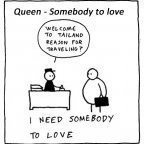Thailand Moves To Revise Economy
-
Recently Browsing 0 members
- No registered users viewing this page.
-
Topics
-
-
Popular Contributors
-
-
Latest posts...
-
200
Border Thai and Cambodian Troops Clash Near Ta Muen Thom Temple
F16 are not that old and they are still in use with USAF but upgraded. Did Thailand get theirs upgraded as well? Don't know. -
178
Can no longer renew driving licence to 5 years, now 2 years only
Good news about the extension... I did not see that in the OP. -
73
Winning
Most of the trumpettes are ignorant to facts and just take trumps propaganda machine for issues he knows nothing about or they are the same type personality as Trump and equally pathetic without a moral compass and lack of true character -
317
BREAKING - WSJ: Trump’s Name All Over The Epstein Files
I specifically referenced the videotape of the deposition. If you don't want to see it ("See no evil"), don't watch it. -
3
Russia Had Compromising Info on Hillary NOT Trump
I liked that video where her detail loaded her into that van like a side of beef when she passed out on the sidewalk. Nothing to see here, move along... -
-
-
Popular in The Pub












Recommended Posts
Create an account or sign in to comment
You need to be a member in order to leave a comment
Create an account
Sign up for a new account in our community. It's easy!
Register a new accountSign in
Already have an account? Sign in here.
Sign In Now